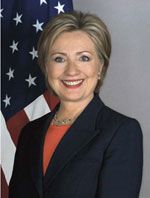The United States' suspension of some economic sanctions against Burma has sparked mixed reaction from analysts and rights groups. Some argue that sanctions should have been lifted long ago. But others point out that rights violations in Burma continue, and fear Washington may be moving too fast.
 The economic restrictions against Burma were originally put in place as punishment for the military government’s human rights abuses, which included a violent suppression of democracy movements, torture and jail for those who dare speak out against military rule.
The economic restrictions against Burma were originally put in place as punishment for the military government’s human rights abuses, which included a violent suppression of democracy movements, torture and jail for those who dare speak out against military rule.
But in the last year, President Thein Sein, despite being a former military officer, surprised critics with a series of reforms. He relaxed controls on the media, released hundreds of political prisoners, and welcomed democracy leader Aung San Suu Kyi into politics.
The United States responded this week by suspending economic sanctions, allowing new U.S. investment in the country for the first time in 15 years.
Aung Thu Nyein, an analyst at the Burma research firm Vahu Development Institute, welcomes the suspension of sanctions, which he called a blunt tool that hurt ordinary people.
“Suspending such kind of sanctions will help [make] a more better situation for the ordinary people," he said.
And removing economic restrictions will also reward and encourage reformists in the government, Aung added.
But, some rights activists, like Phil Robertson, Asia deputy director for Human Rights Watch, caution the United States may be moving too fast.
“We still have numerous political prisoners in jail, " Robertson said. "We have repressive laws that are still on the books. There’s been little change in the way that the Burmese military operates in ethnic areas. The situation in the north with the Kachin and the ongoing war there and the targeting of civilians is a major concern to us. So, we’re a bit perplexed about why there is such undue haste to lift such a wide swathe of the sanctions.”
Washington says sanctions are being eased but not lifted, so they could quickly be reinstated if reforms are reversed.
Some restrictions will remain in place, including a ban on weapons sales, and a list of individuals sanctioned for rights abuses or corruption will continue to be updated.
Aung Thu Nyein says American businesses should be cautious about investing in Burma’s lucrative natural resource extraction. He points out much of the oil, timber, and mining industries take place in ethnic minority areas where rights groups say there are continuing military abuses.
“But at the same time, by you know, U.S. investment, I think it could raise a kind of a standard for competition, and at the same time, kind of ethical, businesses standards in the country,” he said.
The United States is formulating a mechanism to encourage oversight, transparency, and accountability of American investment.
But Robertson said it is not yet clear how it would be enforced.
“The standards in that framework, from what we understand, are not going to be legally binding," he said.
"There’s going to be wiggle room for companies to go in there. And, the question is how will the U.S. government then try to police these engagements by the U.S. companies. So far they’ve basically said that they’re going to allow the companies to go in to just about all sectors.”
Robertson warns of a “gold rush” mentality to invest in Burma and pressure from the U.S. business community not wanting to get left behind.
The United States is the last major government to suspend sanctions against Burma after the European Union, Canada, and Australia.


